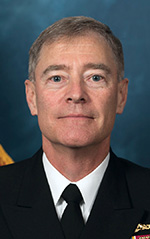The View from the Bridge: Sailing in Formation with the State Department
Message from the Military
BY VICE ADMIRAL FRITZ ROEGGE, U.S. NAVY
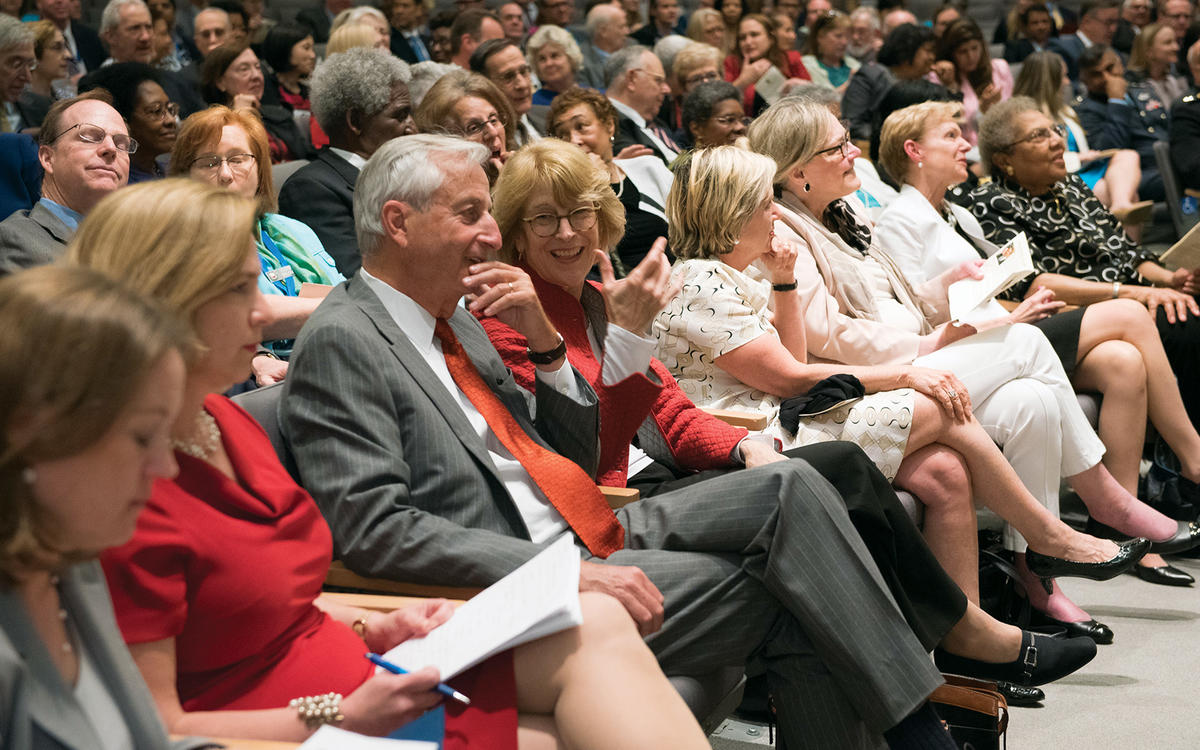
The audience at NDU’s Foreign Affairs Day tribute to the U.S. Foreign Service on May 9. In the front row, from left: Jennifer Spande, State student at the National War College; Katherine Dueholm, State student at the Eisenhower School; former Assistant Secretary of State Eric Boswell; Amb. Beth Jones; Amb. Marcie Rise; Amb. Kristie Kenney; and Amb. Ruth Davis.
NDU / Katie Persons Lewis
The National Defense University offers a tremendous vantage point from which to appreciate the value of America’s diplomats.
During more than 30 years as a naval officer, I always had great respect for the tremendous contributions the State Department makes to protecting the American people and advancing our nation’s interests abroad. In truth, those contributions have often had to be inferred, not observed directly, since I seldom had a Foreign Service officer on board during my submarine deployments or sharing my cubicle in the Pentagon— diplomacy requires more open and overt means of communication than are available from underwater or from a SCIF.
But the significant positive effects of their important work have always been just as clear as in the situations when military officers serve directly alongside diplomats across the globe, working together as we carry out our complementary missions. These partnerships evolve into strong personal bonds based on a shared sense of purpose: to serve the nation, preserve our freedom and promote our values.
In my few months as president of NDU, my appreciation of our diplomats has grown in both depth and breadth because I have been able to witness the great work of the five ambassadors and 62 other State Department and U.S. Agency for International Development personnel assigned to NDU as students, faculty and in leadership positions.
Therefore, one of my top priorities is to strengthen the relationship with the State Department to maximize its mutual benefit as we strive together to prepare our rising leaders— whether military or civilian, American or international—to positively influence the international security environment.
Let me first describe the history of that relationship and then our recent activities to strengthen it.
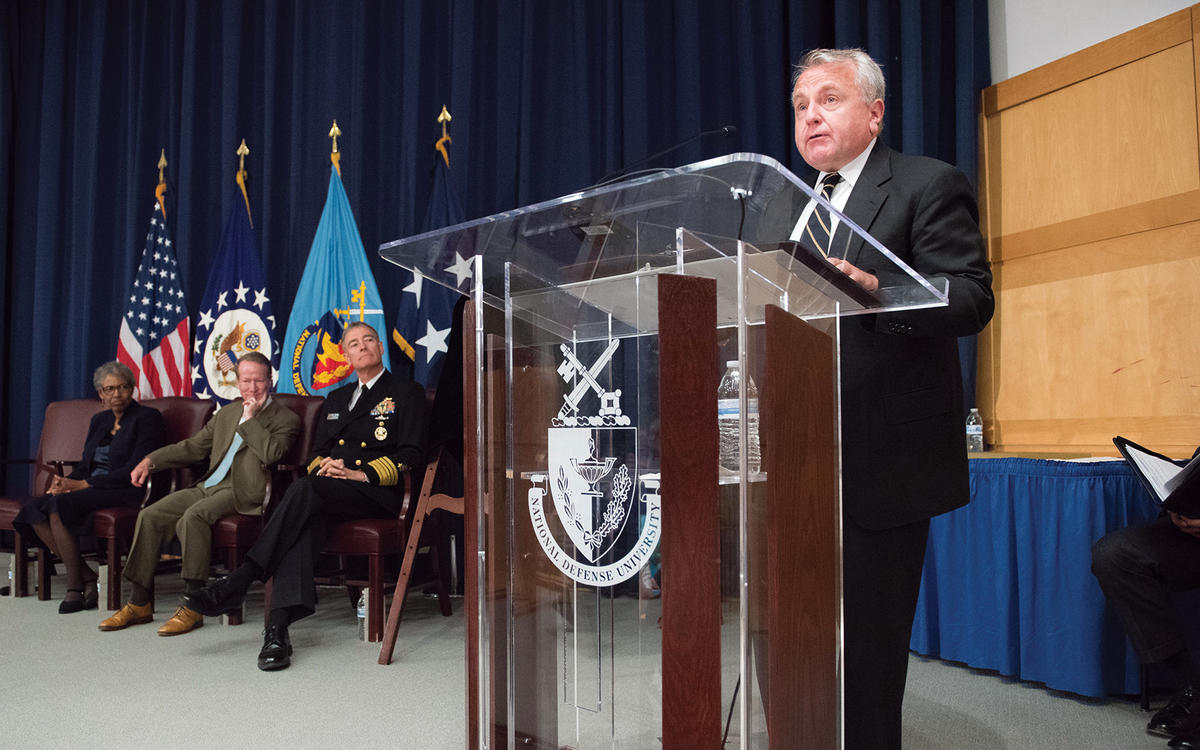
Deputy Secretary of State John Sullivan speaking at the NDU Hall of Fame induction ceremony for Ambassadors Joyce Barr and Bill Brownfield. Seated, from left to right, are Ambassadors Barr and Brownfield and NDU President Vice Admiral Fritz Roegge, USN.
NDU / Katie Persons Lewis
A Long, Close Partnership
NDU is commonly referred to as “the Chairman’s University,” because it falls under the direction of the chairman of the Joint Chiefs of Staff; but the State Department has always been our most important partner outside of the Department of Defense. Ambassador George Kennan served as the first deputy commandant and international adviser at the National War College from 1946 to 1947. Ever since, the State Department has made invaluable contributions to preparing our military and civilian students to become strategic thinkers and to serve as national security leaders.
That close partnership is on display daily across NDU’s two campuses, and it was especially prominent at the recent American Patriot Awards hosted by the NDU Foundation honoring former Secretary of State James Baker and former Secretary of Defense Leon Panetta. The highlight of that evening’s program was when the two Secretaries shared their views on the international security environment.
I was struck that their reflections on the past and the present—through the prisms of a Republican and a Democrat, and the portfolios of State and Defense—were nevertheless consistent in acknowledging that the key to stability and security was, is and will be through diplomacy and the patient hard work that diplomacy demands.
We are privileged to be entrusted with the exceptional professionals State and USAID send to NDU. While I’m confident that every one of them takes from NDU the benefits of a rigorous academic experience, I would like to highlight instead what they give to us. They bring to each discussion a diversity of experience and perspective that exposes us all to a wide range of viewpoints and provides an increased awareness of the uses of all the instruments of national power.
Even for those assigned here as students, the reality is that each of them also serves as a teacher to their fellow students and to the faculty. This diversity of thought is important not only in the classroom, but also in real-world operations—because the ways in which the United States and our partners work together to improve security are joint, interagency and international.
NDU’s five colleges each deliver a unique master’s degree, joint professional military education or graduate certificates to about 2,000 students annually. Delivering those academic outcomes is by itself an ambitious goal, but in the new National Defense Strategy Secretary James Mattis tasked DOD to do more—namely, to use education as a strategic asset to build trust and interoperability across the Joint Forces and with allied and partner forces. A broad demographic helps us to do so.
While half of our students serve in the various branches and components of the U.S. military, the other half is comprised of civilians from across government and international fellows from allied and partner nations. Among the civilians, the largest cohort—nearly 10 percent of all students—comes from the State Department and USAID.
After graduation, they will join an extensive network of national security professionals that includes not only U.S. but international alumni, who now number more than 3,700 from 142 countries. Even more impressive is the quality within this quantity. Because we are entrusted with our partners’ best and brightest rising leaders, our international alumni have gone on to do great things for their own nations.
In fact, more than 100 have risen to the top echelon in their field, such as minister of defense, chief of service or ambassador, making this network powerful as well as extensive—a network that can help us to address the world’s challenging security problems.
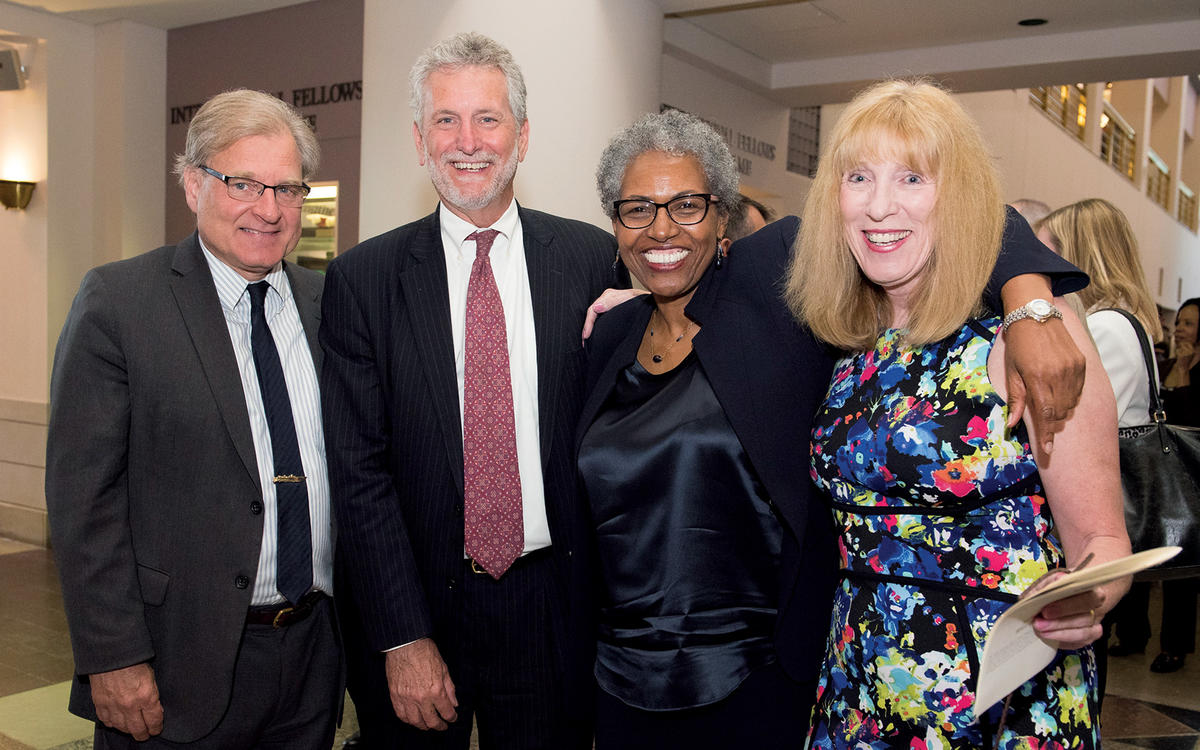
From left to right: Ambassadors Dick Norland, Tom Krajeski and Joyce Barr, with and a former NDU colleague, USAF Colonel (ret.) Christina Lafferty, at NDU’s Foreign Affairs Day on May 9.
NDU / Katie Persons Lewis
New Initiatives
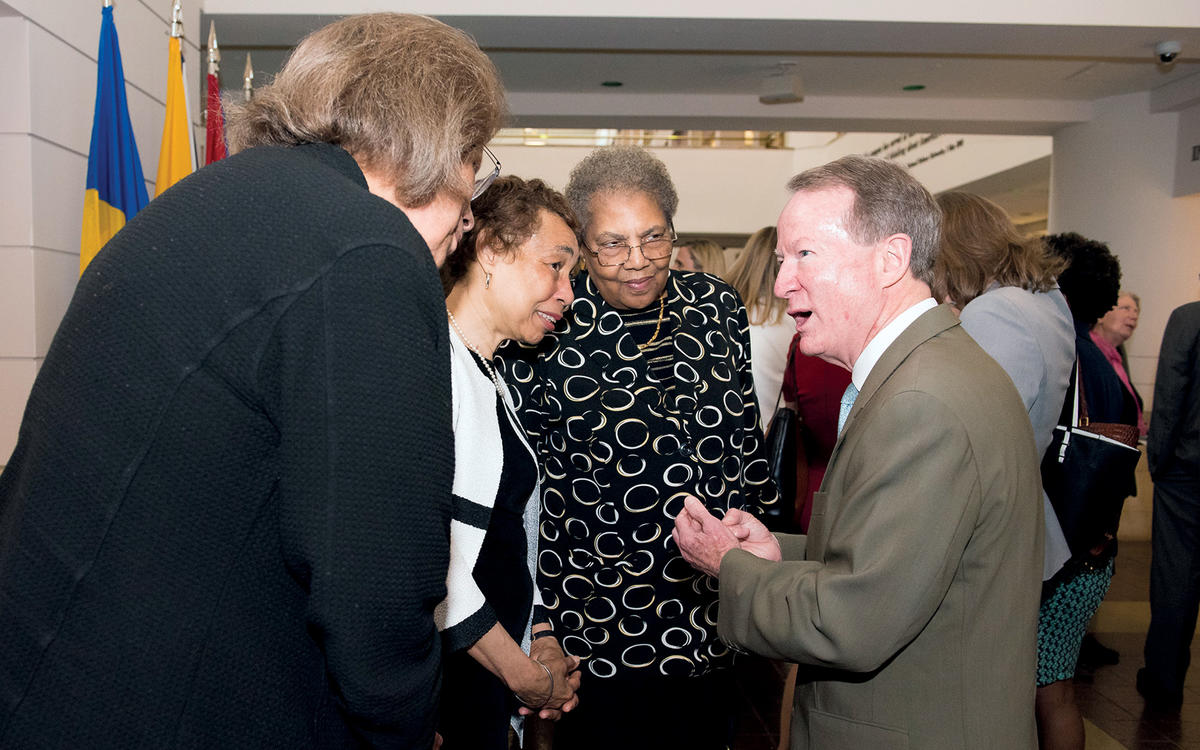
Left to right: Ambassadors Aurelia Brazeal, Sylvia Stanfield, Ruth A. Davis and Bill Brownfield enjoy a moment at NDU’s Foreign Affairs Day on May 9.
NDU / Katie Persons Lewis
In my introductory meeting with Deputy Secretary of State John Sullivan we agreed that the partnership between State and NDU was of great mutual benefit, and we vowed to further strengthen the ties between our institutions. One of the first new initiatives to be pursued was to have State participate in the NDU Scholars program.
Just as has previously been done with the combatant commanders, State will suggest some of the wicked problems that could benefit from a fresh perspective. NDU students can then adopt one of these problems for their thesis work and propose strategies for a way forward.
This is a win/win: incorporating real-world problems into the curriculum makes the educational experience even more relevant and meaningful, and the results can be useful for policymakers as they can consider new insights and innovative recommendations.
To implement this program and to further strengthen our teaching team, the State Department is providing additional faculty for the next academic year—seasoned practitioners who offer firsthand experience on the value of diplomacy and development work.
Another expansion of an existing practice resulted in NDU’s inaugural “Foreign Affairs Day” in May. Military organizations routinely celebrate the contributions of their constituencies, such as each October when the birthdays of the U.S. Navy and U.S. Marine Corps are commemorated.
This year, on May 9, NDU recognized our diplomats’ service with a birthday celebration and also inducted two Foreign Service NDU alumni into the NDU National Hall of Fame: Ambassador Joyce Barr, ICAF/Eisenhower Class of 2001; and Career Ambassador William R. Brownfield, National War College Class of 1993.
Deputy Secretary Sullivan delivered the keynote remarks, in which he recognized that “NDU plays an important role, not just in shaping the leadership of our armed forces, but also in molding our diplomatic leaders, such as Ambassadors Bill Brownfield and Joyce Barr. Their induction is emblematic of the strong partnership between the State Department and the National Defense University to produce a broad array of exceptional national security leaders.”
The partnership between the State Department and NDU has an important history, and an equally important future. The importance of our work together to promote peace and security around the world is well captured in an observation from former United Nations Secretary General Kofi Annan: “Education is, quite simply, peace-building by another name. It is the most effective form of defense spending there is.”
The talented and diverse group of midcareer professionals assigned to NDU arrive as tactical and operational experts in their fields. If we do well at providing them a world-class education, they will leave us as strategic thinkers capable of launching ideas that could preclude the need to launch ordnance.
The Civ-Mil Partnership: Building Relationships for Success
NDU helps civilians better understand the U.S. military, but it also does an outstanding job of training all its students to engage in critical analyses of past and present national security issues so that we can better serve our country in the future. Plus, NDU’s program for international fellows is a diamond in a crown full of sparkling gems. An Israeli student once told me how he’d spent several hours talking to a Lebanese officer while on a bus trip to Philadelphia: ‘I wouldn’t be able to have that experience anywhere else in the world,’ he said. ‘This program doesn’t just give us an education, it advances your foreign policy objectives! That’s incredible.’
—Ambassador Wanda Nesbitt, former NDU senior vice president and National War College alum
As a student at the National War College, my classmates included the future chairman of the Joint Chiefs and the current COCOM for AFRICOM. I have forged lifelong relationships with classmates and have continued to serve with them, both civilian and military, in my assignments in Afghanistan, Somalia and in a number of postings in Africa. The NDU experience is unique, unmatched and important for us in playing a critical role in diplomatic relations and developing U.S. national strategic policy.
—Ambassador Don Yamamoto, former NDU senior vice president and National War College 1996 alum
Our success as diplomats is predicated on effective cooperation with our interagency counterparts, particularly as we rise to lead country teams. Being an NWC alum provided me instant credibility with our military colleagues. In times of crisis or confronting tough problems, no place prepares you better than NDU. It teaches you to think strategically, but equally important provides you a go-to network.
—Ambassador Mike Hammer, acting NDU senior vice president and National War College 2007 alum
NDU provides a critical platform for Foreign Service officers to explain the importance of diplomacy as an instrument of U.S. national power and to assist our military colleagues in appreciating the role that diplomacy plays in ensuring national security during peacetime and war.
—Ambassador Makila James, current NDU National War College faculty and alum
At the NWC, we all gained a deep knowledge of how our military and civilian counterpart organizations tick. As mission director in Iraq, I found myself planning the largest U.S. government humanitarian assistance program in Iraq since the end of the war. I was thrust in front of the media alongside my three-star military colleague to explain it all to the press. My NWC experience taught me that while I need to be the development and humanitarian assistance expert in the room, success will only be achieved when we work together.
—Sarah Lynch-Healy, USAID senior deputy assistant administrator, NDU National War College alum
Part of the National War College experience is learning not just from the professors and the readings, but also from the other students. NWC students typically have 15 to 25 years of experience in the military, DOD civilian agencies, the intelligence community, Department of Homeland Security, USAID and elsewhere, so seminar discussions are not just academic; they’re deeply grounded in professional experience. It’s the graduate program you’ve spent the first 15 to 20 years of your career preparing for.
—Jennifer Spande, NDU National War College 2018 alum
Both within and outside the seminar experience, NDU has provided numerous opportunities to establish friendships across the military services and governmental agencies that I know will last for decades to come. Nothing can replace that intuitive sense of now understanding how our military colleagues may approach an issue; and, while our perspectives may differ slightly, we have developed a mutual rapport and respect that transcends uniforms and missions and strengthens our commitment to public service.
—Brad Bell, NDU Eisenhower School 2018 alum
It is useful to examine the theory and social science behind our foreign affairs work, reading classics of international relations and having access to current cutting-edge research. It’s also gratifying to know that the contributions of the Department of State are valued by our interagency partners. We see a rich mix in the faculty—professional academics and experienced practitioners from the military and the interagency add to a tapestry of viewpoints.
—Danny Fennell, NDU College of International Security Affairs faculty and alum
Read More...
- “Working with the U.S. Military: Let’s Take Full Advantage of Opportunities”
- “The Foreign Policy Advisor Program: Leveraging Diplomacy to Provide for a Smarter Defense”
- “Grooming Tomorrow’s National Security Leaders: State’s Partnership with the National Defense University”
- “From the Field: State Goes to the Pentagon”

